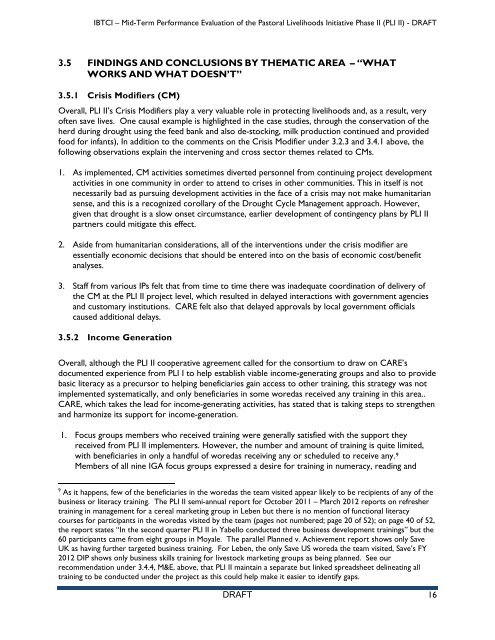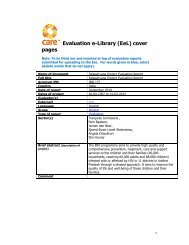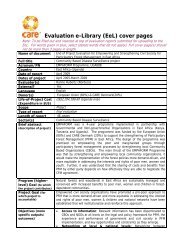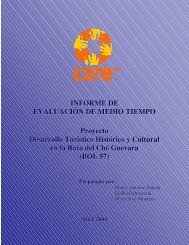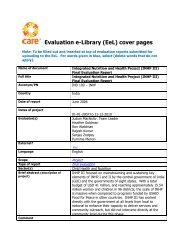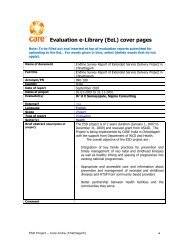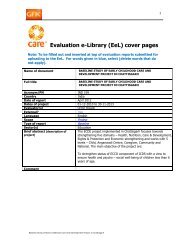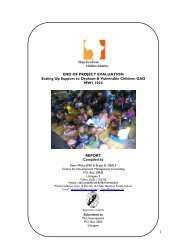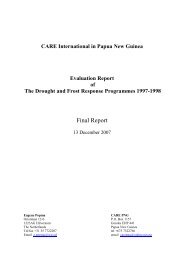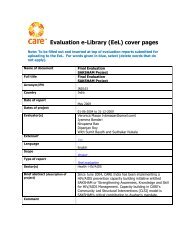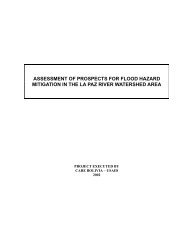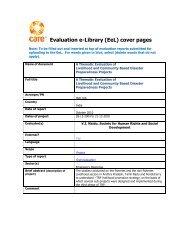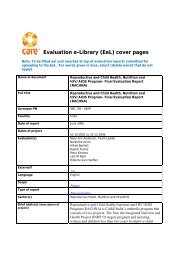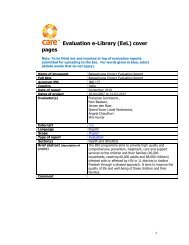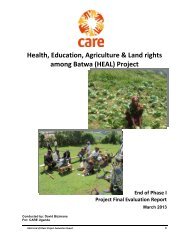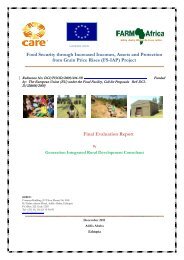Mid Term EVALUATION PLI II project - CARE International's ...
Mid Term EVALUATION PLI II project - CARE International's ...
Mid Term EVALUATION PLI II project - CARE International's ...
Create successful ePaper yourself
Turn your PDF publications into a flip-book with our unique Google optimized e-Paper software.
IBTCI – <strong>Mid</strong>-<strong>Term</strong> Performance Evaluation of the Pastoral Livelihoods Initiative Phase <strong>II</strong> (<strong>PLI</strong> <strong>II</strong>) - DRAFT<br />
3.5 FINDINGS AND CONCLUSIONS BY THEMATIC AREA – “WHAT<br />
WORKS AND WHAT DOESN’T”<br />
3.5.1 Crisis Modifiers (CM)<br />
Overall, <strong>PLI</strong> <strong>II</strong>’s Crisis Modifiers play a very valuable role in protecting livelihoods and, as a result, very<br />
often save lives. One causal example is highlighted in the case studies, through the conservation of the<br />
herd during drought using the feed bank and also de-stocking, milk production continued and provided<br />
food for infants), In addition to the comments on the Crisis Modifier under 3.2.3 and 3.4.1 above, the<br />
following observations explain the intervening and cross sector themes related to CMs.<br />
1. As implemented, CM activities sometimes diverted personnel from continuing <strong>project</strong> development<br />
activities in one community in order to attend to crises in other communities. This in itself is not<br />
necessarily bad as pursuing development activities in the face of a crisis may not make humanitarian<br />
sense, and this is a recognized corollary of the Drought Cycle Management approach. However,<br />
given that drought is a slow onset circumstance, earlier development of contingency plans by <strong>PLI</strong> <strong>II</strong><br />
partners could mitigate this effect.<br />
2. Aside from humanitarian considerations, all of the interventions under the crisis modifier are<br />
essentially economic decisions that should be entered into on the basis of economic cost/benefit<br />
analyses.<br />
3. Staff from various IPs felt that from time to time there was inadequate coordination of delivery of<br />
the CM at the <strong>PLI</strong> <strong>II</strong> <strong>project</strong> level, which resulted in delayed interactions with government agencies<br />
and customary institutions. <strong>CARE</strong> felt also that delayed approvals by local government officials<br />
caused additional delays.<br />
3.5.2 Income Generation<br />
Overall, although the <strong>PLI</strong> <strong>II</strong> cooperative agreement called for the consortium to draw on <strong>CARE</strong>’s<br />
documented experience from <strong>PLI</strong> I to help establish viable income-generating groups and also to provide<br />
basic literacy as a precursor to helping beneficiaries gain access to other training, this strategy was not<br />
implemented systematically, and only beneficiaries in some woredas received any training in this area..<br />
<strong>CARE</strong>, which takes the lead for income-generating activities, has stated that is taking steps to strengthen<br />
and harmonize its support for income-generation.<br />
1. Focus groups members who received training were generally satisfied with the support they<br />
received from <strong>PLI</strong> <strong>II</strong> implementers. However, the number and amount of training is quite limited,<br />
with beneficiaries in only a handful of woredas receiving any or scheduled to receive any. 9<br />
Members of all nine IGA focus groups expressed a desire for training in numeracy, reading and<br />
9<br />
As it happens, few of the beneficiaries in the woredas the team visited appear likely to be recipients of any of the<br />
business or literacy training. The <strong>PLI</strong> <strong>II</strong> semi-annual report for October 2011 – March 2012 reports on refresher<br />
training in management for a cereal marketing group in Leben but there is no mention of functional literacy<br />
courses for participants in the woredas visited by the team (pages not numbered; page 20 of 52); on page 40 of 52,<br />
the report states “In the second quarter <strong>PLI</strong> <strong>II</strong> in Yabello conducted three business development trainings” but the<br />
60 participants came from eight groups in Moyale. The parallel Planned v. Achievement report shows only Save<br />
UK as having further targeted business training. For Leben, the only Save US woreda the team visited, Save’s FY<br />
2012 DIP shows only business skills training for livestock marketing groups as being planned. See our<br />
recommendation under 3.4.4, M&E, above, that <strong>PLI</strong> <strong>II</strong> maintain a separate but linked spreadsheet delineating all<br />
training to be conducted under the <strong>project</strong> as this could help make it easier to identify gaps.<br />
DRAFT 16


